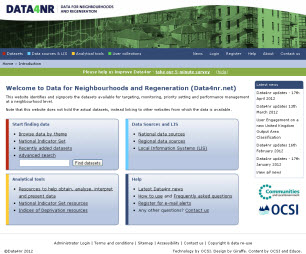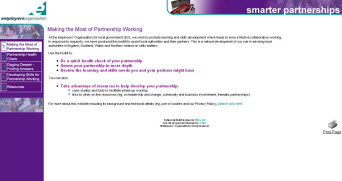Category: Interactive Tools
Data4nr.net was a pioneering website signposting neighbourhood-level regeneration and renewal data and resources. It was provided by OCSI and Educe on behalf of Communities and Local Government (CLG).

We worked with OCSI to explore ways of making the site, Data for Neighbourhoods and Regeneration, all the more valuable to users and potential users, leading to redesign of the site. Data4nr.net brought together datasets from a range of providers including Neighbourhood Statistics, Nomis (Labour Market Statistics) and a range of government departments including DWP, CLG and the Department of Health. It organises the datasets by theme, and provides detailed metadata to enable users to locate and interpret the data they need more effectively. In addition, the Data4nr service mapped Local Information Systems and provided links to analytical tools for understanding and using datasets, as well as links to key data suppliers. The refreshed site included:
- links to national indicators and policy outcome data, as well as links to related datasets and resources
- more cross-references on related datasets, for example, to possible denominators or proxy datasets
- news items highlighting relevant material on other sites
- improved navigation and an updated interface, – while still aiming to retain the ease with which you can use the site
Its use was widely recommended for local authorities preparing Local Economic Assessments and Child Poverty Assessments.
Data4nr has since provided a platform for the Government’s Open Data initiative, Data.gov.uk.
Permanent link to this article: https://www.educe.co.uk/?p=224
The Smarter Partnerships website was designed to helps users improve partnership skills and performance.

It included:
- interactive tools to assist individuals, cross-agency teams and partnerships assess both (i) partnership development and (ii) individual and team learning needs. Work your way through the stages, and get advice for actions you can take, appropriate to your circumstances.
- on-line resources: case studies, tools and links to help users address learning needs and improve partnership working
Smarter Partnerships was one of the first partnership toolkits to be developed, and was for a long time the only freely available one which was genuinely interactive, in allowing users to assess their partnership, and their learning needs in real time, and receive feedback on what they can do to address these needs.
We continued to have approaches from other organisations to make use of the materials. Smarter Partnerships tools have featured in their ‘Support for Collaborative Contracting’ package (Learning and Skills Improvement Service), developed to support supply chain partnerships amongst learning providers. Other examples of use included adaptation for an adult basic skills partnership and for an aboriginal drugs and alcohol partnership in Perth, Western Australia.
Smarter Partnerships was developed by Educe for the Employers Organisation for Local Government – now part of the Local Government Association. The project was originally funded by the then Department for Education and Skills, and built on a ‘state of the art’ review ( pdf 205KB) in 2000 of partnerships and local government.
pdf 205KB) in 2000 of partnerships and local government.
Permanent link to this article: https://www.educe.co.uk/?p=139
‘Five Vital Lessons: Successful Partnership with Business‘ was an interactive website featuring tools, good practice lessons and case studies relating to getting the most out economic development partnerships involving the private sector. Aims to help you achieve your common goals with less pain and more gain.
Tools included:
- High Performing Partnerships (how well is your partnership performing?)
- Partnership Life Cycle (work out how to make your partnership more productive)
- Involving the Private Sector (ways of maximising the benefits of business involvement in partnerships)
The tool was originally developed (with GFA Consulting) for the Department for Education and Skills in April 2001.
Permanent link to this article: https://www.educe.co.uk/?p=141


